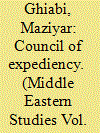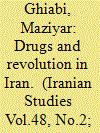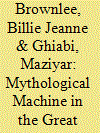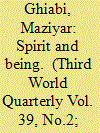|
|
|
Sort Order |
|
|
|
Items / Page
|
|
|
|
|
|
|
| Srl | Item |
| 1 |
ID:
166772


|
|
|
|
|
| Summary/Abstract |
Giorgio Agamben argues that in contemporary governance the use of ‘emergency’ is no longer provisional, but ‘constitutes a permanent technology of government’ and has produced the extrajudicial notion of crisis. The engendering of ‘zones of indistinction’ between the law and its practice is what Agamben defines as a ‘state of exception’. This article adopts the notion enunciated by Agamben and revisits it in the Islamic Republic of Iran. There, the category of crisis has been given, firstly, a juridical status through the institution of maslahat, ‘expediency’, interpreted in a secular encounter between Shica theological exegesis and modern statecraft. Secondly, crisis has not led to the production of a ‘state of exception’ as Agamben argues. Instead, since the late 1980s, a sui generis institution, the Expediency Council, has presided and decided over matters of crisis. Instead of leaving blind spots in the production of legislative power, the Expediency Council takes charge of those spheres of ambiguity where the ‘normal’ – and normative – means of the law would have otherwise failed to deliver. This is a first study of this peculiar institution, which invites further engagement with political phenomena through the deconstruction and theorization of crisis politics.
|
|
|
|
|
|
|
|
|
|
|
|
|
|
|
|
| 2 |
ID:
137171


|
|
|
|
|
| Summary/Abstract |
On 27 June 1979, Ayatollah Khomeini declared, ‘drugs are prohibited” and their trafficking, consumption and “promotion” were against the rules of Islam and could not take place in the Islamic Republic. This ruling, although informal in nature, sanctioned a swift re-direction of Iran's previous approach to narcotic drugs, both in terms of production and consumption. As had happened in 1955, Iran seemed ready to go back to a policy of total prohibition and eradication of opiates, this time under the banner of Islam rather than that of the international drug control regime. Drugs and the politics surrounding them have been a crucial, yet neglected, aspect of the history of modern Iran that have changed the nature of the state bolstering its capacity of social intervention, while hindering its legitimacy, in the Pahlavi, as in the republican, era. By moving on “from the analysis of the state to a concern with the actualities of social subordination”, this article attempts to interpret how social subordination and state coercion were practiced and defied in the making of punishment and welfare in the social body of Iran.
|
|
|
|
|
|
|
|
|
|
|
|
|
|
|
|
| 3 |
ID:
180010


|
|
|
|
|
| Summary/Abstract |
The article revisits ‘sectarianism’ as an epistemic venue within the context of a Great Civil War in the Middle East (2001-2021), a label that includes the overarching narratives of political life in the aftermath of 9/11 up to the aftermath of the so-called ‘Arab Spring.’ By introducing the notion of the ‘mythological machine,’ it argues that ‘sectarianism’ is a myth, something that does not exist in real terms, but which has real world effects. The mythological machine is a device that produces epiphanies and myths; it is a gnoseological process, which has cultural, social and political effects through the generation of mythological facts and, as a machine, it does so through both guiding and automatized mechanisms. Through this interpretive shift, the article proceeds through several theoretical steps using a variety of cases from across West Asia and North Africa, contextualizing them within global political events. Firstly, the article argues that it is ‘civil war,’ shaped by the work of the mythological machine that governs state-society relations and transnational politics in the Middle East. Then, the article discusses how the mythological machine incorporates a semantic othering via mythological thinking, speak and practice that shapes the perception and experience of civil wars. To conclude, the article discusses how the mythological machine displaces people’s status in the context of civil wars leading to the emergence of new forms of belonging and nation-making. Ultimately, the mythological machine creates what Giorgio Agamben defines as a state without people, a condition exhausting the value of citizenship and the political.
|
|
|
|
|
|
|
|
|
|
|
|
|
|
|
|
| 4 |
ID:
157718


|
|
|
|
|
| Summary/Abstract |
Few commodities are as global as drugs. Cannabis, opium, heroin, amphetamines, lysergic acid diethylamide (LSD), khat, psychedelic cacti and mushrooms as well as an interminable list of other natural or synthesised substances travel and are consumed around the globe for all possible reasons. Human migration, trade, cultural trends, medical practice, political repression: together they constitute the drug phenomenon today – and indeed in much of human history. In this, drugs are spirit-like commodities, their value resting upon a fundamental ambiguity made up of individual, psychological, social, cultural, economic and medical circumstances. Defining a drug is an attempt at defining a spirit on the edge, which metamorphoses in time and space. At the same time, drugs remain a fundamentally political object. They are substances controlled by states, through mechanisms of policing, legitimated by judicial and medical evaluation, condemned often on moral grounds. Situated between a fluid social existence and a static legal dimension, drugs can become inspiring hermeneutic objects of study.
|
|
|
|
|
|
|
|
|
|
|
|
|
|
|
|
|
|
|
|
|